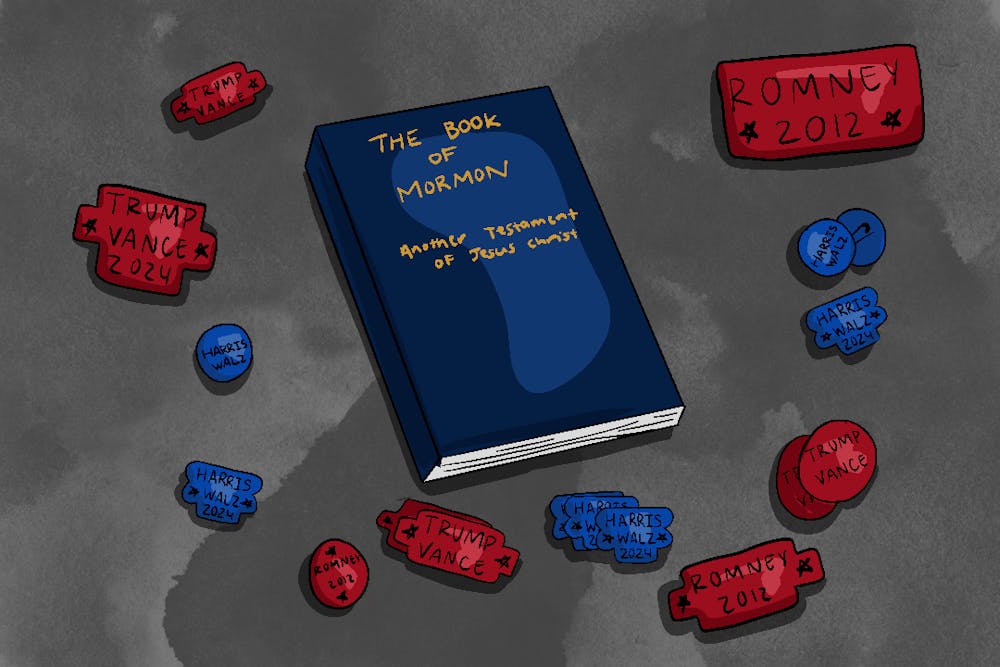Voting is "within the very principles" of Joshua Deland’s religious beliefs.
Deland, a junior studying religious studies and mathematics, is the president of the Latter-day Saint Student Association.
Deland said the Church of Jesus Christ of Latter-day Saints believes "in being good citizens and adhering to politics and laws and listening to government leaders."
Deland said Article 12 from the Articles of Faith reflects this value.
"We believe in being subject to kings, presidents, rulers, and magistrates, in obeying, honoring, and sustaining the law," according to Article 12.
While the church promotes political engagement among its members, it rejects taking a political side.
The church does not "Endorse, promote or oppose political parties and their platforms or candidates for political office," according to its statement on political neutrality.
Without clear political guidelines to follow, members of the faith have decided their political views based on both Latter-day Saint and personal values. Those decisions can have a considerable impact on the upcoming election.
President Joe Biden won the state of Arizona in the 2020 Presidential Election by just over 10,000 votes, according to CNN. The World Population Review reports there are about 440,000 church memberships in Arizona alone — the fourth largest in the country.
Deland doesn't consider himself to be politically passionate, so what he is looking for in a candidate is someone who doesn’t try to "force anything onto anyone."
"As members of the church, we believe very heavily in agency," Deland said. "You can present ideas, present principles, but in the end, you are powerless as a person to make anybody vote a certain way."
The church not only wants its members to vote in elections but also to inform themselves on issues in the political scene and to respect differing views or backgrounds, according to a statement from the church.
Benjamin Langford, a senior studying biomedical engineering and a member of the Latter-day Saint Student Association, does not require his presidential choices to align with the exact values of the church, yet he still votes keeping some core priorities in mind — one being the freedom of religion.
"I think the most important thing is to factor in their policies and what issues are the most important to me and my future family," Langford said.
He also said abortion is a component that takes precedence in the Latter-day Saint vote, claiming the church's policy aligns more with former President Donald Trump and the Republican party.
"I think it (abortion) is a big factor on how people vote, and even more generally, just how they see the candidates," Langford said.
In his most recent presidential debate with Vice President Kamala Harris, Trump said he believes in "the exceptions for rape, incest and life of the mother." This is similar to the church's stance on abortion, which allows exceptions for rape, incest, severe defects that will affect the baby's ability to survive after birth, and when the mother's life is in danger.
The Harris-Walz campaign has made efforts to reach out to the church members by creating groups such as the Latter-day Saints for Harris-Walz initiative.
"I think it's a good strategy," Langford said. "Because I think a large percentage of the members of our church who are eligible voters do vote."
Deland said Harris looking for the Latter-day Saint vote seems unexpected because the Mormon community can be stereotyped as "middle-class white conservative people."
"Typically, Harris being the Democratic candidate, it seems a little unorthodox that she would try to cater towards the church, but I don't see any problem with it," Deland said.
For Rick Erekson, a church member from Mesa, it would be unwise for Harris not to go after any group, but Erekson does not think that she aligns "with the church policy and doctrine."
"I think Trump leans more to the (church) values," Erekson said.
Citing the Capitol insurrection on Jan. 6, 2021, Deland said he believes some of Trump's actions, such as "inciting people to violent means," contradict the church's values.
READ MORE: Political divisions create tension among families, students explain
"He kind of just throws out numbers, throws out statements, and doesn't really truly know what he's talking about," Deland said.
Deland, Langford and Erekson all plan to exercise their right to vote in the November election.
"As members of the church, we like to seek knowledge. We like to be educated, and truly make correct decisions, not only based off of research and facts, but also off of the Spirit of God."
Edited by George Headley, Sophia Braccio, Tiya Talwar and Natalia Jarrett.
Reach the reporter at ehprest1@asu.edu and follow @ellis_reports on X.
Like The State Press on Facebook and follow @statepress on X.
Ellis is a sophomore studying journalism and mass communication. This is her first semester with The State Press. She has also worked at Arizona PBS and Blaze Radio.




